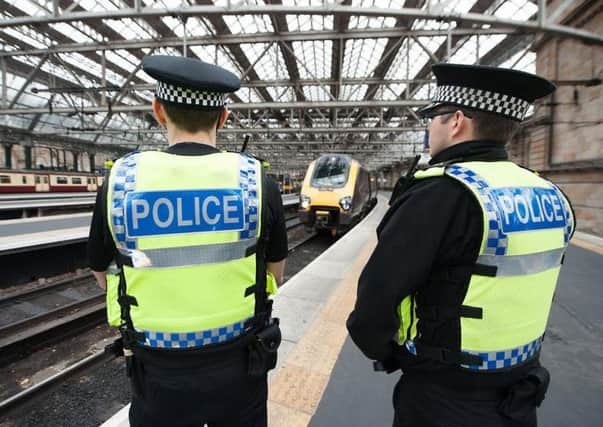National force may not have '˜capacity or capability' to police rail network


Due diligence of the plan to merge British Transport Police (BTP) and Police Scotland has identified support services which exist in the UK-wide force but not its Scottish counterpart.
A report prepared for the Scottish Police Authority (SPA) warns that could lead to “significant differences” in the cost of railway policing, and warns Police Scotland may not currently have the “capacity and capability” to absorb the work of the BTP.
Advertisement
Hide AdAdvertisement
Hide AdBTP’s operations in Scotland cost the rail industry £22 million in 2017/18, according to the report.
The integration of BTP into Police Scotland had been due to take place in April next year, but was delayed earlier this year amid concerns over IT and pension arrangements. An update is expected later this month.
The Scottish Government has come under sustained criticism over the plan, which is opposed by staff associations, rail unions and opposition MSPs.
The new report will be presented to the SPA’s finance committee next week after work carried out by accountancy firm Ernst & Young (EY).
The report states: “The high-level detail provided in the due diligence report is not sufficient to establish whether the individual support services which are currently centrally provided by BTP exist within Police Scotland, and if so whether the function has the capacity and capability to absorb the policing of transport in Scotland.
“In any instance where capacity or capability requires to be increased, or services sourced externally, this may result in significant differences to the actual cost base for Police Scotland in integrating BTP-Scotland. This will only be established after further detailed analysis.”
There are around 220 officers working for BTP in Scotland, with previous research suggesting many could leave rather than join Police Scotland.
Last month the UK’s three largest railway unions, RMT, Aslef and TSSA, called on the Scottish Government to scrap the controversial merger, accusing ministers of putting “nationalist dogma” before passenger safety.
Advertisement
Hide AdAdvertisement
Hide AdNigel Goodband, chair of BTP Federation, which represents officers, said: “This paper reinforces our concerns about the vast amount of work still to be done to establish the costs and benefits of integration.
“It sets out the need for further detailed financial analysis but we know this is unlikely to take place before the new date for integration is set.
“We are at the eleventh hour of the re-planning phase. How can ministers agree an evidence-based date for integration when so many fundamental questions remain unanswered?”
MSPs voted to integrate BTP operations in Scotland into the national police force last year despite concerns.
Dr Kath Murray, a policing researcher at Edinburgh University, said: “After two and a half years planning, there are still serious gaps in the evidence base, with financial implications for Scottish policing and the rail industry.
“It now feels like a good time to look in proper depth at other options that meet the aims of devolution, with fewer risks attached.”
Tom McMahon, interim director of business integration and delivery at Police Scotland, said: “£21.9m is the cost which BTP, in 2017/18, has attributed to the policing of transport in Scotland, including both direct costs and the allocation of central costs.
“BTP currently recover the full cost from train operating companies.
“This figure can only provide an indication as to the potential future cost base for Police Scotland.”